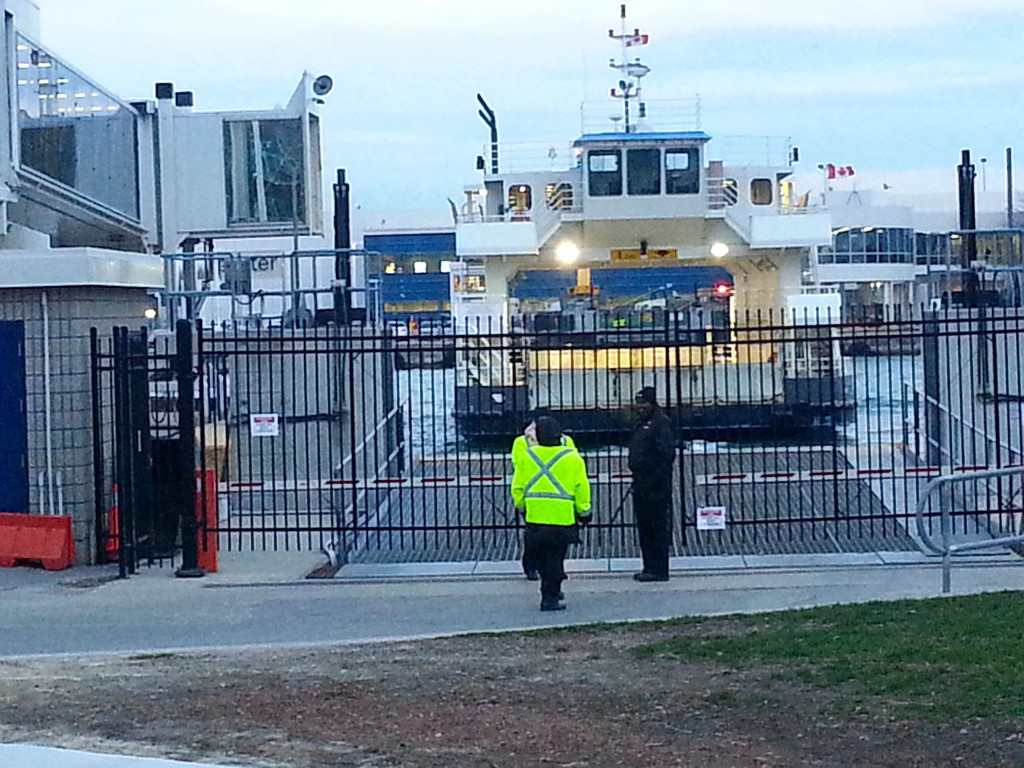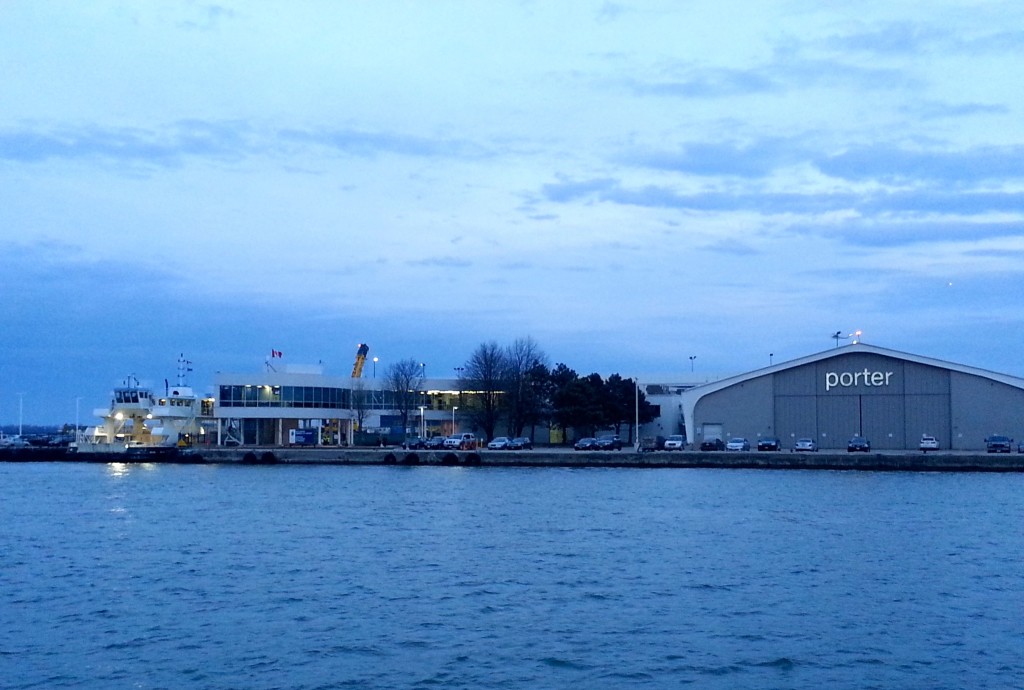by Megan Kinch
A union local of 22 people has been on strike for more than three months. They’ve already been replaced with scab labour. They’ve been called greedy and spoiled for demanding an increase in the starting rate of $12 and basic safety equipment for extremely dangerous and difficult work. They were arrested for handing out leaflets. They faced a court injunction that would ban them from making noise in a public park, and when the employer loses, they are sued for $4 million dollars. Their employer, Porter airlines, is a darling of the local elites, who prefer to bypass Pearson airport for quick flights to New York and Montreal.
Welcome to the new face of labour disputes, which looks more like the worker struggles that inspired Mayday in the 1880s, than the ritualized and symbolic modern strikes. But community members and workers from other unions are coming through with solidarity actions and donations, and the problems keep piling up for Porter.
Porter has effectively refused to bargain, instead trying every strategy to avoid dealing with the workers. Porter and the Toronto
 Port Authority tried to take out a court injunction which would have prohibited leafleting and loud noises in nearby Little Norway park. They lost. But then they sued the union for $4 million over their Twitter account. Both Porter and the workers have strategically used social media, such as Twitter and Facebook, with union supporters making memes and co-ordinating protest blitzes of Porter’s Facebook.
Port Authority tried to take out a court injunction which would have prohibited leafleting and loud noises in nearby Little Norway park. They lost. But then they sued the union for $4 million over their Twitter account. Both Porter and the workers have strategically used social media, such as Twitter and Facebook, with union supporters making memes and co-ordinating protest blitzes of Porter’s Facebook.
Big unions and the OFL have kicked in money and support to this ‘David and Goliath’ fight, but this struggle, and the larger struggle for justice in the workplace, isn’t going to be won with dollars. There has been a significant amount of solidarity shown by workers and community members, on the picket line and at the gates to the ferry, including unions with militant traditions such as CUPE 3903 and the IWW.
Jordy Cummings is an academic worker in CUPE 3903 and has been doing social media solidarity: “I spent three months on the picket line fighting for some degree of job security for precariously employed academic workers, and they ended up legislating us back to work. Little did I know that this was the beginning of the end of legal trade unionism in Ontario. The precedent was set with us, and now strikes are basically illegal. If a union does strike, they are legislated back to work within days or starved out and replaced, as with Porter workers.”
I spoke to Porter fuel worker Enrique Perez. He said that the main demand is not wages, but safety.
“We wrote a letter in April regarding the safety concerns, understaffing, high turnover rate, flight delays and worker injuries,” he said. “You need two people to fuel a plane but we end up having only one person because of staffing problems. That guy over there (points) fell off a plane and broke his arm. I had a night when I almost walked into a propeller. You really need people who’ve been around for a while to tell the new workers stories and sort of warn people.”
Perez said that Porter is refusing to acknowledge the complexities of the job: “Many complicated aspects to the job like where there is ice out, you don’t use salt, you have to use special stuff. They start us at $12, or with a DZ licence they pay 14.50. People are only getting $16 for driving a dumptruck. But this is also a dumptruck that is crossing runways when the planes are landing, carrying 50,000 worth of fuel. We drive it across the runways to put it in the fuel farms 3 times a day.”
Normally, a union is able to stop work by having a picket line which is allowed to halt vehicles for a few minutes on their way in and out of the worksite. This is the main protection against hiring replacement workers, known as ‘scabs.’ But Porter has used the police to break normal normal picket lines and even had people arrested for leafletting. Porter/Toronto Port Authority is also trying to get the right to have their own private police at the airport.
Striking for basic safety demands is something that was supposedly in the past. Canadian labour law is supposed to guarantee a safe workplace. Before the ‘labour peace’ compromise that followed World War 2, pickets lines and unions were often illegal, and had to be enforced through direct action. Unions had to fight private police in what were sometimes pitched battles. It hasn’t got to that point yet, but already picket lines are basically being made illegal through increasing anti-worker regulations.
 James Taylor, strike coordinator for the Porter workers, had this to say about the arrest and the legal difficulties faced by the small union in trying to maintain a picket line. “Unfortunately as a small group we couldn’t picket the entire airport but we figured we could leaflet the passengers. So Mary and I tried because we’re staffers and didn’t want the guys to get arrested. We went over and handed out fliers on the sidewalk, it was pretty chill. The Toronto Port Authority told us to leave and said we were trespassing, and we said “no, we think we have the charter right to be here and distribute leaflets. The didn’t really enjoy those arguments. They got formal trespass letters to give us. In the meantime they called the duty officers and they had 8 or so cops there. They put us both in handcuffs and charged us with trespass and released us on the spot.”
James Taylor, strike coordinator for the Porter workers, had this to say about the arrest and the legal difficulties faced by the small union in trying to maintain a picket line. “Unfortunately as a small group we couldn’t picket the entire airport but we figured we could leaflet the passengers. So Mary and I tried because we’re staffers and didn’t want the guys to get arrested. We went over and handed out fliers on the sidewalk, it was pretty chill. The Toronto Port Authority told us to leave and said we were trespassing, and we said “no, we think we have the charter right to be here and distribute leaflets. The didn’t really enjoy those arguments. They got formal trespass letters to give us. In the meantime they called the duty officers and they had 8 or so cops there. They put us both in handcuffs and charged us with trespass and released us on the spot.”
Lawyer Glen Wheeler from COPE, the union the workers are with, called this “quite outrageous” and said that the court did end up upholding their charter right to hand out fliers.
The local community near the airport is also being drawn into a battle with Porter, who is trying to get permission from the city to expand the Island airport and fly jet planes. Rob Chamberland lives on a boat in a dock near the airport. He says that the people who will be affected aren’t having meaningful input into the decisions being made.
“Remember that there are three main communities, there are the islanders who mainly live on Ward and Algonquin Islands, there are the condo-dwellers, mostly new home owners, and then there’s the boaters, both liveaboards and your average weekend sailor. Then there are those who flock to the waterfront of the island for a day with nature. Life will now include jets, increased noise, increased pollution, and profit over community welfare. Airport expansion means the whole area becomes an industrial zone”
I spoke to Carrie Sharpe, who has been helping coordinate community support for the workers. She spoke about the attempted injunction: “What’s scary is that it was even on the table. This is an attempt to shut down dissent. Porter is trying to discourage dissent at a time when they have an application to have jets fly out of the airport and to fill in some of the lake. This injunction process has already had a chilling effect on mobilization, there will be people now afraid to protest island expansion…they are doing all this in order to shut down protests over the use of public assets for profit.”
Before legalized unionism, community and workers had to work together in order to get any kind of decent standard of living. It was brutal physical and legal repression of the Haymarket protest for the 8 hour work day in Chicago, back in 1886, that started Mayday protests for International Workers Day. Today, many workers still don’t have the 8 hour day and are forced to work more or less, and workplace safety is being rolled back. The old formalized picket structures aren’t working anymore. In this new era of labour disputes, workers and community members in solidarity (who are often workers themselves somewhere else) are going to have to jointly struggle against corporate impunity and greed. This is already happening with the Porter airlines strike, and with this year’s Mayday protest the solidarity is getting more solid!
Comments
Pingback: Toronto’s May Day 2013 in Photos | alex felipe: ramblings